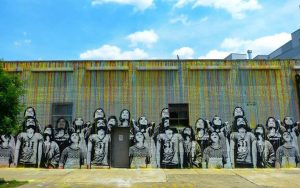
Since the early 90’s Berlin has been one of the most influential cities for genre-defining electronic music. While climbing slow, and heavily influenced by a new movement coming from the United States, Western Europe had started growing fond of a new shade of dance music.
Pushing past the late 80’s pop dance trends, and returning to unexplored areas of a post 60’s Disco Fever freeze-out, places like Berlin, and Manchester (with garage, then techno) move towards unexplored areas of the industrial dance spectrum. Things started out quiet, slow, whispered, under the radar. Fan-boy DJ squads, pooling cash to rent out abandoned properties to indulge in the music, ambiance, culture. Adapting quicker, Berlin has become (along with smaller various hot-spots), an early adopter of the techno genre and all its sub-genres. With staple-venues such as Tresor and Berghain, the techno scene is extremely strong, and rivals Ibiza in terms of music taste definition. As in, when you go to Ibiza, DJs tend to adapt song selections in tune with the Balearic island beach life. Where as in an urban jungle such as Berlin/Manchester, harsher tones, and heavier tracks are played. Overseas clubs tend to have a more clearer definition of places where you can, say, listen to some very offbeat retro disco-techno (e.g. Palms Trax), or typical basement bangers from say Len Faki or Adam Beyer, or mellowed out grooves a-la some of the Boiler Room acts. So you know what you’ll get when you get there.
While initially starting out in the east, and spreading to newcomer markets such as Hollywood and Las Vegas, the genre has found a comfortable cushy spot, perfect for non-conformists in a non-conformist utopia, Brooklyn, NY.
But over the pond in the U.S. , the spread is a little murky, as culture has to define clearly its taste for the specific genres. Even though it started here, from Detroit and Chicago, the popularity of underground music movements while slow at first in the U.S., quickly started to level out the strong presence of the genre already now matured in Europe.
In the early days Detroit dominated the underground glitchy techno scene and paved the way for strong DJ acts such as Richie Hawtin, Derrick May, Juan Atkins etc to establish their presence in the scene and start their journey towards domination. This has shifted the movement across the country and landed harder in New York. But while sleeping in the underground, off-commercial genres lay dormant in the basements, away from typical clubs (e.g. Cielo, Pacha etc.) while exploring the style blanket slowly. Until recently.
After the absolute explosion of EDM in America, snobby ears and mainstream scoffers pushed the boundaries of commercialism to the limits of the genre, into creating a shade of the techno subculture already existing in Detroit and Chicago for decades. While initially starting out in the east, and spreading to newcomer markets such as Hollywood and Las Vegas, the genre has found a comfortable cushy spot, perfect for non-conformists in a non-conformist utopia, Brooklyn, NY.
Starting from Flash Factory in Manhattan, other paramount techno behemoths such as Verboten (now-R.I.P), TBA, Output, etc. started quickly popping all over Williamsburg , and started cuddling major techno giants with residencies. This has continuously strengthened the scene and created a market competition growing fast.
Maybe America isn’t ready for the Berghain debauchery and doors opening at 12 AM yet. And maybe Brooklyn is not ready for hard techno, and a Berlin-esque raw industrial assault, where in every sound sample other than the kick drum sounds like a medieval blacksmith’s wet dream. But nevertheless, Brooklyn is trying. There is still room for the genre to be rounded up, and also still time.
However, Brooklyn likes things deeper, slower, glitchy and very, very minimalistic, with a dash of retro. A new wave of new faces moves techno past its industrial well..past, and into the obscure. Creating a unique mix of hard hitting melodic glitch, that…well…it’s not too bad to be honest. And while saving up by not heavily booking large international names, it is instead promoting subculture newcomers with smaller names but pristine repertoires. This keeps the music going while building up audience and maintaining a certain hipster-ish subdued style of techno I’d shyly dare to name Brooklyn-techno.
Yet very few clubs in Brooklyn do however come close to the prestige and scale of Berghain, Tresor or others. With promising new establishments such as Schimanski, (in the place of old Verboten) among the few elite, and forking over crazy cash to techno heavyweight kings like Carl Cox, Richie Hawtin, Chris Liebing, Brooklyn has become the hotbed of the techno arm of EDM in the United States.
So then, is Brooklyn the new Berlin? And has it yet matured to rival venues like Berghain? No. Is it however, getting there? “Oh yes Oh yes!”

